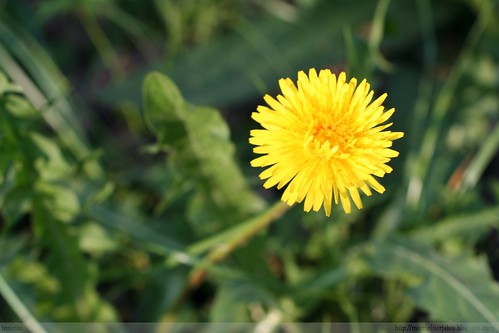
They see Unkraut (bad weeds)...
... I see the peerless beauty of evolutionary success.
Monday, 27 April 2009
Subscribe to:
Post Comments (Atom)

Die Murmeltierjahre im Land des Frühschoppens by Toni Palau is licensed under a Creative Commons License.
2 comments:
Ich hab noch nie verstanden warum man Unkrautvernichtungsmittel braucht.Aber wahrscheinlich bringt das unsere ungeduldige Zeit so mit sich.Keiner hat mehr Zeit Pflanzen die er nicht will nur ganz einfach auszugrasen.
Ich finde Loewenzahn schoen,nicht zuletzt wil er gesund fuer Tier und Mensch ist.Beliebtes Futter bei Hasenzuechtern,ausserdem kann man die getrockneten Blueten als Tee verwenden bei Leberkrankheiten.Oder aber einen Verdauungsschnaps daraus produzieren.1Handvoll Blueten waschen mit zwei grossen Essloeffeln braunem Zusker bestreuen,und das ganze mit Klarem Schnaps uebergiessen, 1/3 Blueten 2/3Schnaps.Verschlossen in einem Glas ca 14Tg. in der Sonne am Fensterbrett sitzten lassen .Jeden Tag einmal kraeftig schuetteln.Nach 14.Tg.abseihen und in Flaschen aufbewahren.
es gibt keine Krankheit fuer die nicht ein Kraut gewachsen ist.
Waehrend des Krieges hat meine Grossmutter aus getrockneten Babel (Loewenzahnwurzeln) Kaffee ,den sie im Volksmund Muckfug nannten gebraut.Herzliche Gruesse G.
Gitta said...I never really understood why do people need weed-killer products. But probably it is a consequence of our impatient era. Nobody has the time to uproot the plants she doesn't want any more.
I think dandelions are beautiful, not only because they are healthy for people and animals. They are very popular as bunny fodder, and the flowers may be used dried as herbal tea. Or to home-make digestif: wash a handful flowers, scatter 2 big tablespoons of brown sugar and baste it with schnapps (1/3 flowers, 2/3 schnapps). Let it rest in a closed jar in the sun for 14 days. Shake it every day. After 14 days strain it and store it in bottles.
There is no illness for which there is no herbal remedy. During the war my grandmother made coffee out of "Babel" (dandelion roots). They called it "Muckfug".
Herzliche Gruesse G.
Gitta, many thanks for your recipe! Maybe we'll try it :)
What fascinates me about dandelions is their incredible dispersion and the fact that they are able to grow on the most difficult grounds.
And they have, like daisies, the modest beauty of the very common flowers.
Thanks for your comment!
LG T.
Post a Comment